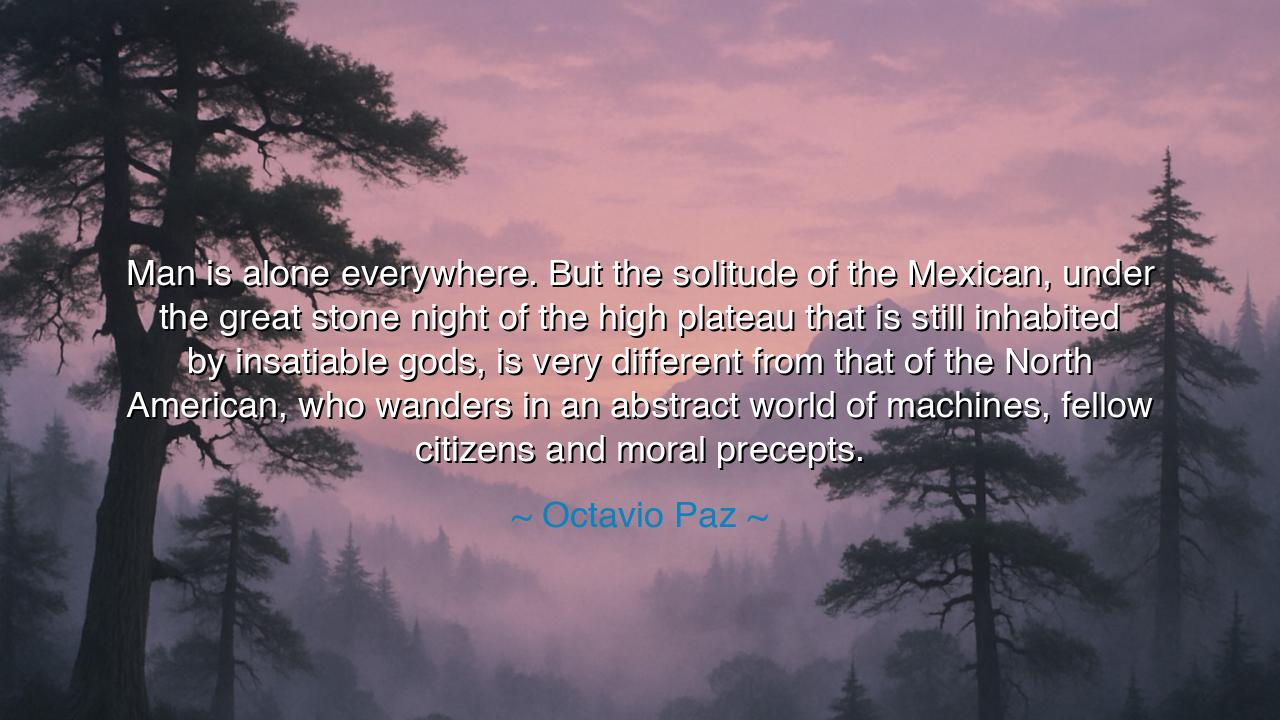
Man is alone everywhere. But the solitude of the Mexican, under
Man is alone everywhere. But the solitude of the Mexican, under the great stone night of the high plateau that is still inhabited by insatiable gods, is very different from that of the North American, who wanders in an abstract world of machines, fellow citizens and moral precepts.






In the profound and haunting words of Octavio Paz, the poet-philosopher of Mexico, we encounter a meditation on the eternal human condition: “Man is alone everywhere. But the solitude of the Mexican, under the great stone night of the high plateau that is still inhabited by insatiable gods, is very different from that of the North American, who wanders in an abstract world of machines, fellow citizens and moral precepts.” In this declaration lies both lamentation and revelation — a recognition that all men carry within them the ache of solitude, yet that solitude takes on the colors of their land, their history, their gods. Paz, the heir to both the ancient spirit of Mesoamerica and the modern disquiet of the West, shows us that to understand a people, one must first understand the kind of loneliness that shapes their soul.
When Paz speaks of the solitude of man, he does not mean mere isolation, but the metaphysical estrangement of the human heart — our awareness of being suspended between earth and eternity, between creation and death. Every culture, every person, must confront this solitude in its own way. Yet the Mexican’s solitude, says Paz, is ancient, vast, and sacred. It is the solitude of the high plateau, where the earth itself seems to brood in silence under the gaze of long-dead gods. It is a loneliness carved from centuries of conquest and resistance, where the spirit of the people still wrestles with the gods of the earth and the ghosts of their ancestors. This solitude is heavy, mythic — a dialogue with eternity itself.
In contrast, the North American’s solitude, Paz tells us, is not born of gods or nature, but of abstraction. It is the solitude of a man surrounded by machines, bound by systems, caught in the web of endless motion and moral reasoning. His world is not haunted by divine silence but filled with the mechanical hum of progress. His loneliness is not cosmic but existential — a sense of disconnection amidst abundance, of alienation within community. He wanders not in deserts or mountains but in the sterile corridors of modern life, where everything is efficient, yet nothing is sacred.
The ancients would have understood both these solitudes. The Greek faced his loneliness through reason and art, carving meaning from chaos with the chisel of philosophy. The Aztec, gazing upon the same heavens, offered blood and prayer to sustain the fragile order of the world. Both sought to reconcile the human with the divine. But in the modern age, man has replaced the gods with machines, and the ritual with consumption. In the process, he has silenced the voice of the earth. Paz, in his sorrowful wisdom, warns that without that dialogue — without reverence for the living mystery — the human soul grows thin, its solitude sterile instead of sacred.
Consider the story of Frida Kahlo, the great Mexican painter whose solitude reflected that same cosmic tension. Her pain was both physical and spiritual — the wound of the body and the wound of history. Yet she did not flee from her isolation; she transfigured it into art. In her paintings, the ancient symbols of Mexico — monkeys, roots, blood, the sun — mingle with the intimate anguish of the self. Through her solitude, she forged a language that spoke both to her ancestors and to the modern world. Like Paz, she turned loneliness into revelation, and thus gave voice to the soul of her people.
From Paz’s reflection, we learn that not all solitude is the same. The solitude of the Mexican is full of memory and presence — it is shared with gods, with stones, with the eternal landscape. The solitude of the modern man, however, is hollow, filled with echoes of productivity and noise. One is a communion with mystery; the other, an escape from it. Paz calls us to recognize this difference, not to despise the modern, but to recover what the modern has forgotten: the sacred dimension of being alone. For solitude, when embraced as a path to meaning, can lead to wisdom; but solitude that denies the soul leads only to emptiness.
Therefore, my child, do not flee from solitude, but seek to understand it. Let it not be the loneliness of the machine, but the silence of the mountain. Sit beneath the vast sky, and feel that you are part of something older and larger than yourself. Do not let progress make you forget wonder, nor let comfort silence your hunger for the divine. For every human heart is a small high plateau, haunted by its own gods. To live fully is not to escape that solitude, but to make peace with it — to find in its stillness not despair, but the heartbeat of creation.
And so, heed the wisdom of Octavio Paz: all men are alone, but it is the quality of our solitude that defines the shape of our soul. The modern man wanders among machines and moral codes; the ancient man stands beneath the stars and listens. Be as the latter. Let your solitude be not a cage, but a temple. In its silence, you will hear the whisper of eternity — and there, perhaps, you will find yourself again.






AAdministratorAdministrator
Welcome, honored guests. Please leave a comment, we will respond soon